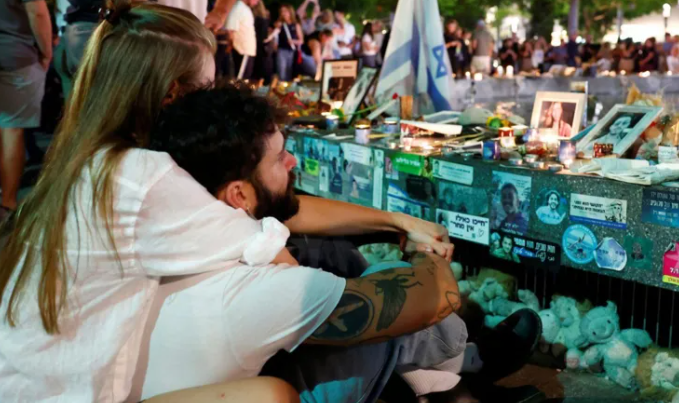Israel has conducted memorial ceremonies to honor the victims of the mass killings and abductions carried out by Hamas on 7 October 2023, amid ongoing conflict in the Gaza Strip and Lebanon. A year after the attack, which claimed around 1,200 lives and left 251 people hostage, Israeli Prime Minister Benjamin Netanyahu vowed to prevent such an assault from happening again, asserting that Israel’s military was “changing the security reality” in the region.
Since 7 October, Israel’s offensive in Gaza has led to nearly 42,000 deaths, according to the Hamas-run health ministry. As the memorial day unfolded, Israel reported intercepting over 100 rockets fired by Hezbollah from Lebanon, alongside projectiles launched by Yemen’s Houthis and Hamas from Gaza.
Throughout the night, rocket warning sirens blared in northern Israel, and several towns were declared closed military zones as Israel appeared ready to intensify its ground operations along the Lebanon border.
On Tuesday morning, the Israel Defense Forces (IDF) confirmed that Suhail Hussein Husseini, Hezbollah’s logistics commander, was killed in a “precise, intelligence-based strike in the Beirut area” on Monday. Hezbollah has yet to comment on this.
Husseini was reportedly in charge of managing Hezbollah’s most sensitive projects, including its war plans and special operations, the IDF said. The US has expressed support for targeting Hezbollah in Lebanon, but it fears Israel’s limited operation might escalate into a larger, prolonged conflict.
Amid discussions between American and Israeli officials over Israel’s response to the recent Iranian missile attack, CIA Director William Burns warned that there is a “very real danger of further regional escalation.”
Last October, Hamas gunmen breached the border fence and attacked Israeli villages, military posts, Kibbutzim, and the Nova music festival. On Monday, families of the hundreds killed and dozens taken hostage at the festival gathered at the site for the first memorial event of the day.
During the memorial events for the victims of the October 2023 Hamas attacks, families held pictures of their loved ones and listened to the last track played at the Nova music festival before Israeli President Isaac Herzog led a moment of silence at 06:29, marking the exact time the assault began. Smaller commemorative events took place in communities also attacked by Hamas gunmen.
Prime Minister Benjamin Netanyahu visited the Iron Sword memorial in Jerusalem, lighting a candle to honor the fallen and the hostages. In Tel Aviv’s largest park, an event called the Bereaved Families Memorial Ceremony was held, offering an alternative to the official government ceremony.
The event featured emotional performances by some of Israel’s most popular singers, and images of the victims flashed on screens. The stage was decorated with symbolic items from the attacks, including burnt cars from the Nova festival and a child’s bicycle from the Be’eri kibbutz.
Globally, US President Joe Biden condemned the “unspeakable brutality” of the Hamas attacks, expressing his horror over the subsequent war and the suffering of civilians. Vigils were held in various countries, including Australia, South Africa, Germany, and the US.
In the UK, Labour leader Sir Keir Starmer affirmed Israel’s right to defend itself, while Prime Minister Rishi Sunak called for all sides to “step back,” emphasizing that there was no military solution to the crisis.
However, as the memorials took place, fighting continued. The Israeli military reported that Hezbollah had launched over 130 rockets from Lebanon, with most intercepted but some hitting Haifa and Tiberius. Hamas also fired rockets at Tel Aviv from Gaza, and ballistic missiles from Yemen were intercepted. Throughout the day, Israel conducted multiple air strikes and ground incursions in Lebanon.
The Israeli military said it was expanding operations against Hezbollah, warning residents in southern Lebanon to avoid using boats in the sea or rivers south of the Awali river.
Three weeks of intense Israeli strikes and other attacks in Lebanon have killed more than 1,400 people, and displaced another 1.2 million, according to Lebanese authorities.
Hezbollah – a Shia Islamist political, military and social organisation that wields considerable power in Lebanon – has remained defiant despite suffering a series of devastating blows in recent weeks, including the killing of its leader and most of its top military commanders.
On Monday, the group insisted it was “confident… in the ability of our resistance to oppose the Israeli aggression”.
Israel’s government – which designates Hezbollah as a terrorist organisation – has pledged to make it safe for tens of thousands of displaced residents to return to their homes near the Lebanese border after a year of cross-border fighting sparked by the Gaza war.
The hostilities have escalated steadily since Hezbollah began firing rockets into northern Israel on 8 October 2023, the day after its ally Hamas’s deadly attack on southern Israel.



